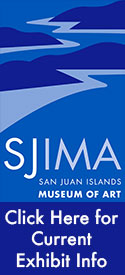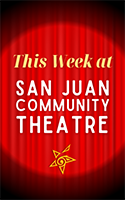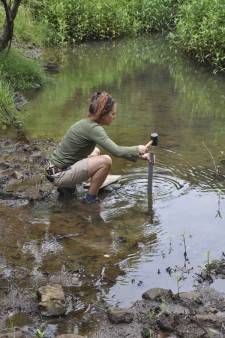Easter Island: 15,000 Years of Discoveries
Posted July 27, 2014 at 5:42 am by Tim Dustrude
The Whale Museum’s Lecture Series:
Easter Island: 15,000 Years of Discoveries
Presented by Candace Gossen
The Whale Museum is pleased to welcome Candace Gossen as part of the 2014 Summer Lecture Series. Candace will discuss “Easter Island: 15,000 Years of Discoveries” on Wednesday, August 6 at 7:00 p.m.
Candace Gossen, PhD, is an environmental archaeologist, architect, plant medicine teacher and just a girl that likes to dig in the dirt and climb trees. Recently returned from the island, she has new and exciting information to share. For the past 12 years, Candace Gossen has cored the crater lakes on Easter Island to challenge the current story that humans cut down the forests and caused their own demise. She wanted to know if there was another reason such as climate change, drought, insects or something else yet unknown that may have caused the disappearance of the largest palm trees in the world (16 million of them). Before 1980 there was no evidence that any tree existed on this island ever.
In 1920, Carl Skottsberg, a naturalist sailing the South Pacific Islands, conducted the first survey of the plants and living things on the island. He found what most explorers landing in the 1700s wrote about as a barren grassland with no trees standing over 10′ tall. However, Skottsberg claimed this island should be anything but a grassland, something was wrong. He called the crater lake, Rano Kao a “somewhat dangerous quagmire which cannot be bored with usual methods.” Gaining world attention to a collapse theory, Jared Diamond has written the story of deforestation but it must be changed because new scientific discovery has proved there was instead innovation, adaptation and hope.
The August 6th lecture event is free and open to the public. For more information, call (360) 378-4710 ext. 30. The Whale Museum is located in Friday Harbor at 62 First St. N. Founded in 1976, The Whale Museum’s mission is to promote stewardship of whales and the Salish Sea ecosystem through education and research. In addition to providing exhibits, the Museum also provides programs including the Marine Naturalist Training, Orca Adoption Program, Soundwatch Boater Education, San Juan Islands Marine Mammal Stranding Network, and the Whale Hotline. The Whale Museum can be found on-line at www.whalemuseum.org.
You can support the San Juan Update by doing business with our loyal advertisers, and by making a one-time contribution or a recurring donation.
Categories: Around Here











No comments yet. Be the first!
By submitting a comment you grant the San Juan Update a perpetual license to reproduce your words and name/web site in attribution. Inappropriate, irrelevant and contentious comments may not be published at an admin's discretion. Your email is used for verification purposes only, it will never be shared.